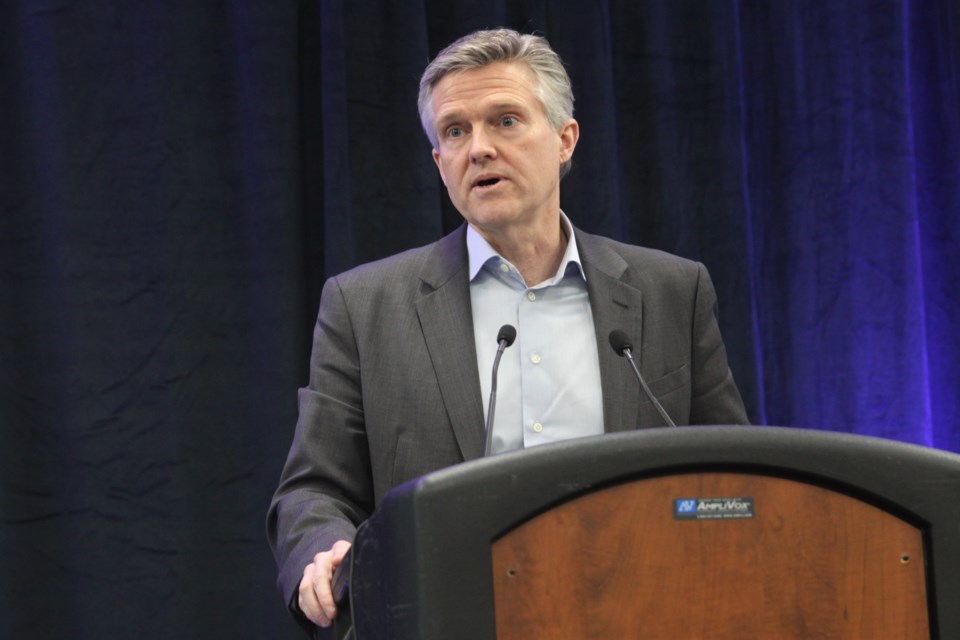TORONTO, Ont. - The provincial government is reporting a record high deficit this year as it continues to prioritize spending to address the COVID-19 pandemic.
Minister of Finance Rod Phillips tabled the 2021 provincial budget in Queen’s Park late Thursday afternoon, which includes a $38.5 billion deficit.
“As the people understand, the current level of government spending is neither sustainable or desirable,” Phillips said while delivering the budget in the Ontario legislature. “But as a global pandemic continues around the world, it is absolutely necessary today.”
The deficit is expected to be reduced by $10 billion over the next three years and is projected to be $33.1 billion next year and $28.2 the following year.
The budget includes $187 billion in total spending this year and Phillips said it is based on three pillars, including protect, support, and recover and builds upon the province’s action plan to address COVID-19, which now sets out a total of $45 billion in financial support over three years.
The province is also setting aside $4 billion next year and $2 billion the following year to dedicated pandemic contingency funds.
“No one knows what direction the pandemic will take or what direction the economy will take,” Phillips said. “We need to be prepared for anything.”
The budget includes $7.5 billion in new funding for responding to the pandemic, which includes $572 million for hospitals to support the additional costs of COVID-19.
Phillips said the province is also investing more than $13.5 billion to support people and job creators.
This will include once again offering parents $200 per child under the age of 12 and $250 for children under the age of 21 to offset the additional costs of COVID-19.
There is also a proposed tax credit for seniors in 2021, which would provide a 25 per cent credit on home renovations up to $10,000.
Looking ahead to recovery from the affects of the pandemic, the province is investing $4.8 billion to support job growth now.
“As we deal with the day-to-day anxiety of the impacts of COVID-19 it may seem ambitious to talk about recovery,” Phillips said. “But hopefully one day soon COVID-19 will fade. For Ontario to recover we need strong sustained economic growth. We cannot expect our economic to just bounce back. We need to start working on the recovery now.”
The province is moving to reduce taxes for job creators by lowering provincial property tax rates to a 0.88 per cent for more than 200,000 properties, which the government says will create $450 million in annual savings in 2021.
The 2020 budget also outlines a plan to reduce the burden on employers of Ontario's high-cost contracts with non-hydro renewable energy producers.
In January, 2021 a portion of the cost of these contracts will be funded by the Province.
“For a mine in Northern Ontario, this means a savings of $270,000 a month or $3.2 million a year,” Phillips said.
The official opposition is criticizing the government’s fiscal plan, saying it does not take enough new actions to make families feel healthier or safer during the pandemic.
“Doug Ford is telling seniors in dangerously understaffed long-term care homes that more staff won’t come in this year – they’re on their own,” said NDP leader Andrea Horwath.
“He’s leaving more than 30 kids packed into classrooms. He’s chosen to give no new money to public health, leaving families at grave risk. Mr. Ford’s budget has no help for the jobs and small businesses at risk of disappearing. Workers aren’t even getting the paid sick days they need to stay home and stop the spread.
“He’s throwing in the towel on the fight against COVID-19, and telling people, families and businesses that no help is coming.”
Before the tabling of the budget, the NDP was calling for the provincial government to bolster COVID-19 testing by hiring more public health staff, provide funding to hire 10,000 personal support workers and increase wages by $5 an hour, fund a class size cap of 15 students per classroom during the pandemic, and paid sick days for all workers.
“Investing in people and businesses now will save us so much — it will save lives, it will save jobs, and it will save us the anguish and much greater expense of a longer and deeper struggle with COVID-19,” Horwath said.
Phillips will provide another fiscal update at the end of March 2021.
